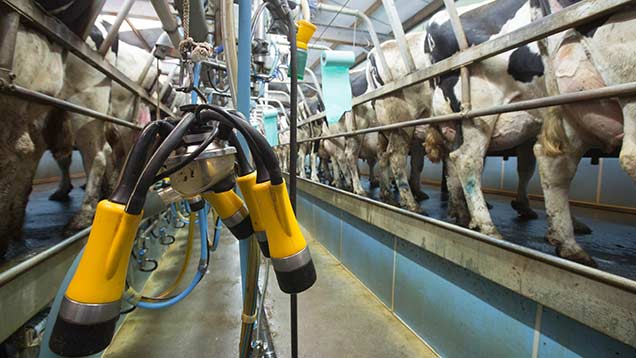5 issues raised by the First Milk shock news
 (c) Tim Scrivener
(c) Tim Scrivener First Milk’s sudden news shocked the dairy sector on Thursday (8 December).
Finding out you must wait two more weeks to be paid for milk is tough to take. And the big hike in capital contributions its co-op members pay is effectively a retrospective December and January price cut.
The business needed to plug a multimillion-pound cashflow hole, but it is the 1,300 First Milk farmers who have to bail it out. The pain will bite next week when bills have to be paid.
Talking to farmers, the overwhelming emotion is uncertainty. That’s because this one announcement raises several big issues.
Give us your views
What do you think of First Milk’s shock news? Send your views to Charlie Taverner.
- How and when milk is priced – First Milk has to announce a milk price to its farmers more than two months before it pays out. That meets the 30-day notice in the voluntary code of practice, but means the business must guess its returns well ahead of time – a year ahead, in the case of cheese. In a falling market, First Milk has been paying out more than it can afford. Early pricing might give farmers certainty, but does it help a crisis-hit industry?
- Trouble in springtime – First Milk’s statement stressed four times the pressure it will face in the spring flush, when UK milk volumes could hit a 20-year high. It also mentioned new pricing models that match market demand, suggesting Thursday’s changes, though pre-emptive, might not be the last. Processors of all sizes will be fighting to find the best-value homes for all the milk. The Global Dairy Trade auction might be creeping upwards, but traders stress the market is fundamentally weak. More turbulence could be ahead.
- Are First Milk’s changes enough? – Rightly or wrongly, every snippet of bad First Milk news is followed by mutterings of “Remember Dairy Farmers of Britain?” First Milk directors framed Thursday’s news as “a new beginning”, as it chose to ask co-op members to contribute more rather than relying on extra borrowing. Taking action now should put it in a better position down the road. An oft-touted long-term solution is for a bigger company to buy First Milk, or for it to merge with another co-op. But, with a thinly spread milk field and many small suppliers, the business needs to be in decent shape to attract interest. Which is important because…
- What is the alternative for First Milk members? Leave or get dropped by a milk buyer and you would be lucky to get a new contract right now. More than 100 farmers supplying brokers have reportedly been served notice this winter on their current deals. UK milk supplies are still 2.4% up on last year’s high levels. At a time like this, First Milk’s commitment to buy and market every litre of its members’ milk should be valued. It raises the question: Is a low-priced, but safe home for your milk better than no home at all?
- We’re all in this together – When a co-op goes back to its members asking for emergency cash, it stretches the collaborative ethos to the limit. With milk prices at little more than 20p/litre, few First Milk members will be making money. Now they must forgo a fortnight’s milk cheque and invest 1.5p/litre extra. There’s a thought that British farmers don’t do co-ops like their continental cousins, that they take a shorter-term, more individual view. That’s arguable. What’s not is that farmers can get more involved in the major decisions their co-op takes. It is their business, after all. Expect an interesting 30 January First Milk AGM.
See more
